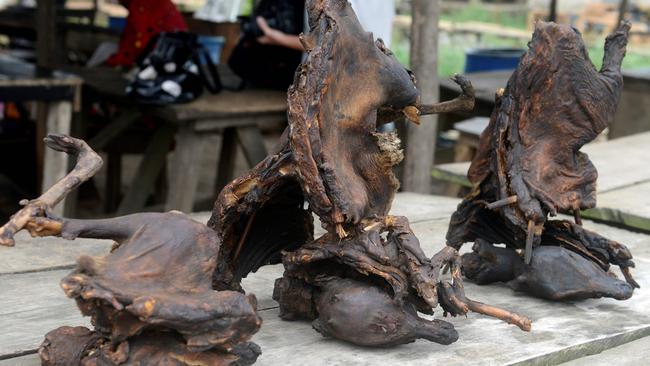Coronavirus: ‘Ban wildlife meat or face new crisis’, new paper says
Pandemics caused by human abuse of wildlife could be the tipping point for the collapse of civilisation, a new paper says.

Pandemics caused by human abuse of wildlife could be the tipping point for the collapse of civilisation, and the bushmeat trade should be banned immediately, a new paper on the Earth’s sixth great extinction has said.
Co-authored by Paul Ehrlich, the rock-star ecologist who shot to fame with “population bomb” warnings about limits to growth, the paper hits the alarm on species loss and puts Australia high on the list of concern.
Published in Proceedings National Academy of Sciences on Tuesday, the paper says the human-caused sixth mass extinction of species was accelerating, adding pressure to add biodiversity to climate change at the top of international concerns.
The paper says it is “imperative that wildlife trade for human consumption is considered a gigantic threat to both human health and wildlife conservation”.
“Therefore, it has to be completely banned, and the ban strictly enforced, particularly in China, Vietnam, Indonesia and other countries in Asia,” the paper says.
“There is no doubt, for example, that there will be more pandemics if we continue destroying habitats and trading wildlife for human consumption as food and traditional medicines.
“It is something that humanity cannot permit, as it may be a tipping point for the collapse of civilisation. What is at stake is the fate of humanity and most living species.”
The paper examined 29,400 species of terrestrial vertebrates and found that 515 species (1.7 per cent) were on the brink of extinction because they had fewer than 1000 individuals.
Australia was second on the list because of pressure on small marsupials, topped only by South America, which is facing a catastrophic decline in frogs.
The paper says the ongoing sixth mass extinction “may be the most serious environmental threat to the persistence of civilisation because it is irreversible”.
“Thousands of populations of critically endangered vertebrate animal species have been lost in a century, indicating that the sixth mass extinction is human-caused and accelerating,” it says.
“The acceleration of the extinction crisis is certain because of the still fast growth in human numbers and consumption rates.”
Researchers, led by Gerardo Ceballos from Mexico University, found many of the species that had been driven to the brink would likely become extinct soon.
They said human pressures on the biosphere were growing rapidly, and a current example was COVID-19, which was linked to wildlife trade.
Associate professor Diana Fisher from the School of Biological Sciences at the University of Queensland said the study was very relevant to Australia.
“Ceballos and colleagues show that our region has the second-highest number of land vertebrates on the brink of extinction, despite being the smallest continent,” she said.
Noel Preece, a university fellow at the Research Institute for the Environment and Livelihoods at Charles Darwin University, said the “on the brink” paper “seriously underestimates the plight of native species”.



